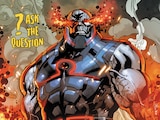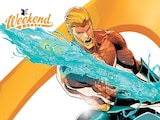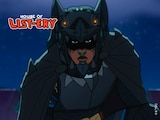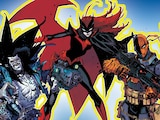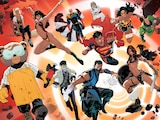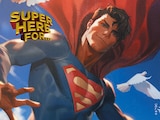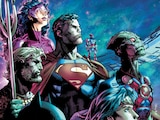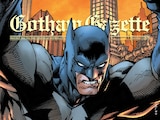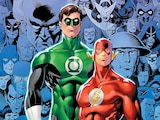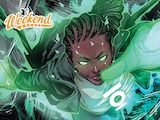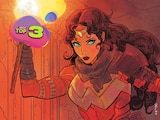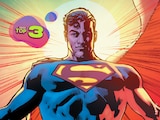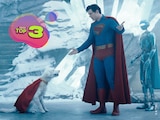SPOILER ALERT: The following interview contains spoilers for Outsiders #1. We recommend reading it after you’ve read the issue.
If you’ve ever wanted to take a closer look at DC’s often tangled continuity, Outsiders is the story for you. Centered on Batwoman, Luke Fox and a mysterious third character, Outsiders promises to explore the least understood corners of the DC Universe and may be the most ambitious series of Dawn of DC to date. The series arrives care of writer duo Jackson Lanzing and Collin Kelly (Batman Beyond: Neo-Year) and artist Robert Carey, who makes his DC debut with this series.
It’s never felt like a better time for a series like this. Last year’s Dark Crisis on Infinite Earths brought back the Infinite Earths, unleashing new opportunities for stories set deep within the multiverse. With every Crisis event, the DCU has either grown or shrunk and Outsiders can finally give us answers now on how the outer fringes of the DCU have changed over time.
Recently, we spoke with Lanzing and Kelly about some of the big twists in Outsiders #1, so be warned, spoilers lie ahead!
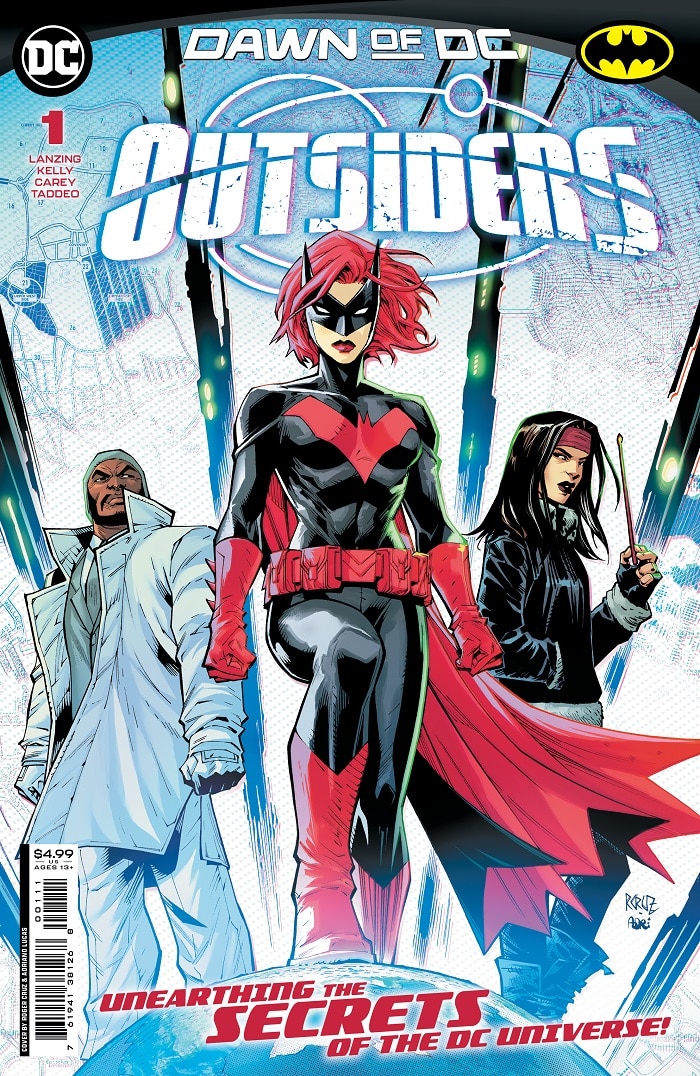
What inspired you to come up with this radically different version of the Outsiders?
Jackson Lanzing: So, conception of the Outsiders started pretty backwards from how we normally go after a book. Which is to say that normally, when we come after a story, we have the name, we have a basic setup of what the company wants and what the objectives are for the character.
With Outsiders, it was very different. It came out of some very open-ended conversations with Ben Abernathy at DC, talking about what to do with Kate Kane and Luke Fox. These were two characters that they had tried in a few different modes and hadn't really felt like they'd hit a stride with, and they'd sort of become these outsider figures in the Bat line where they were plugging them in and trying to figure them out. But that since James Tynion [and his run on Detective Comics], they hadn't really known what to do.
Fortunately, James is a close friend of ours. We love to follow his work, and we've collaborated on things like Azrael before. So, it felt like a really unique chance to take and evolve past what James had done and move it into our own framework that felt really interesting. I think we spent about eight months talking about this and kicking it around and seeing what kind of book it would be. Would it be an espionage book? Would it be a spy book? Would it be a globetrotting book?
The one thing that we kept coming back to was that we wanted to tell a story that took these two characters who felt like outsiders, get them out of Gotham and get them into a framework that let them experience the wider spectrum of DC Universe stories and hopefully open up their experience, their personalities and their relationships. Use that to carry these characters forward and hopefully make an imprint where it's like, "Okay, these characters will never be the same because they've had this eye-opening experience."
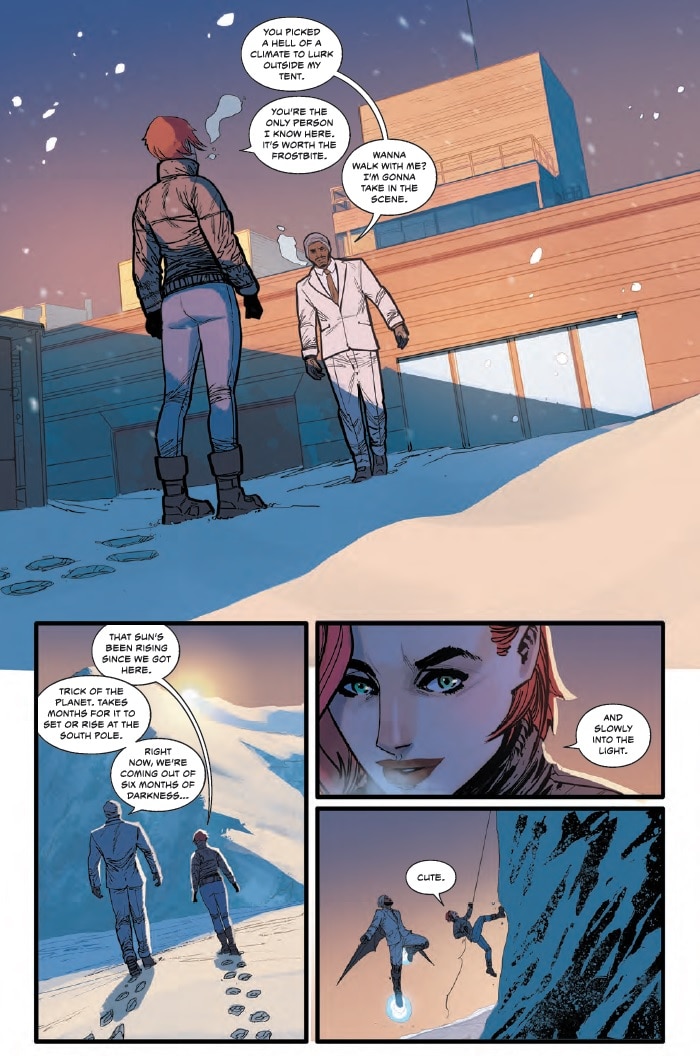
Collin Kelly: This was Ben having full trust in us to tell a story of weight and consequence, which is why we really wanted to take the time to gestate and build something that we knew could really deliver on that promise. It is rare in comics that you get a chance to take a big swing with an unknown number of unknown length. You have the chance to do something that matters and not have to fear being chopped off at the knees, so that was really what we were walking on to do. Not to just tell a story involving Luke and Kate and really bring these characters to a new place, but also to tell something that is going to be revelatory for our fans and for our storytelling, as well.
JL: And then obviously, the last piece of that puzzle was that we have these two characters, are we going to do this as a two-person team up? Are we going to frame them around others? We felt like a third character is a great dynamic. They already have a dynamic, Luke and Kate, that was established in Detective Comics, and it felt like it was really smart for us to bring in a third character that would allow for that to evolve. As we talked about what narrative frameworks allow for three characters to go globetrotting and dig into history and ideas, there were some obvious…references.
There was one obvious reference in Planetary—a book of real weight and consequence for both Collin and I. It’s a book that really mattered to us and a lens into the WildStorm universe, which is what brought me back into comics as a young man. I really responded to those books, and I feel like we've gotten to a space now where we have something to say about them. It's not just like playing with the toys. If we're going to bring these back, we want to talk about what they've meant, how their meaning has evolved in our lives, in the lives of fandom and in the lives of the stories, and then how they can then relate back to Luke and Kate.
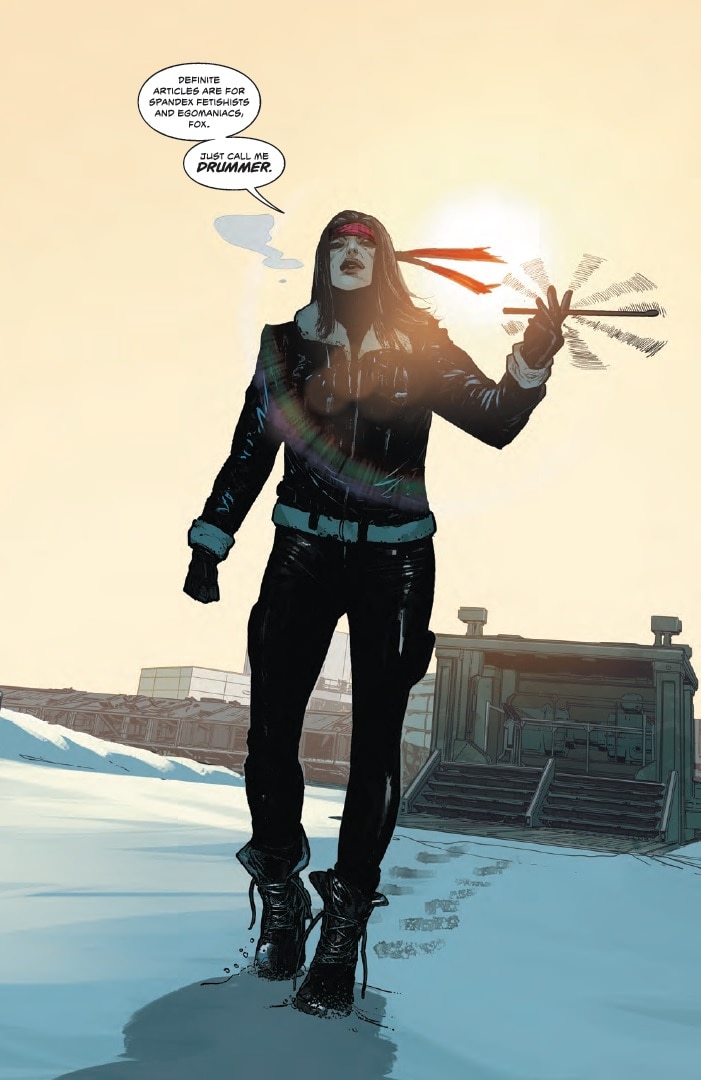
Speaking of WildStorm, tell us about this new Drummer, a name that's familiar to a lot of WildStorm fans. I noticed she also only has one drumstick.
JL: So she does.
CK: We are very excited to introduce this new Drummer. We think that as a character, she has so much to reflect with both Kate and Luke—they all have things to learn from each other. It has been very cool for us to write an older woman as a protagonist. It's a perspective we don't often get to play with much, and we both are the children of effectively single mothers and we have strong women in our lives. Whenever we have the chance to assay that kind of a character, bring them to the forefront, it's an absolute pleasure for us. We love Drummer. We are going to do some exciting things with her and anything else would be...
JL: Classified. That whole part of the planetary guide has been redacted. I think what I will say is, we're not being coy for no reason. It's the backbone of the book. Every issue is going to give you a deeper peek into who this character is, why this character exists and how her presence in the DC Universe will affect Luke, Kate and in large part, the entire DC Universe over the course of Outsiders.
When you look at her face, you can see that she's someone who's really lived a life, and it's taken a lot to get to where she is. You know that there's a lot of stories behind her eyes. And I'm sure we'll find out the truth behind all that.
JL: You absolutely will. I'm going to use this as a way to deflect and talk about Robert Carey because I do think that she was his first design for the book. Robert is designing at least one thing in every issue because we're introducing a lot of new things with Outsiders. And this is Robert's first book at DC. So, him coming in and being like, "Immediately I'm going to take this and really make something out of it," has been amazing to watch. He just has such a unique vibe and unique design sense and has this really great sort of punk rock, post-EU Ireland-like thing that he does that's incredible.
But I think the thing that I'm really excited about is how haunted Drummer looks. What she has seen has left its marks on her mind. We don't want to have a combat character who comes in with a bunch of scars. We want a character where you can look in her eyes and see the scars.
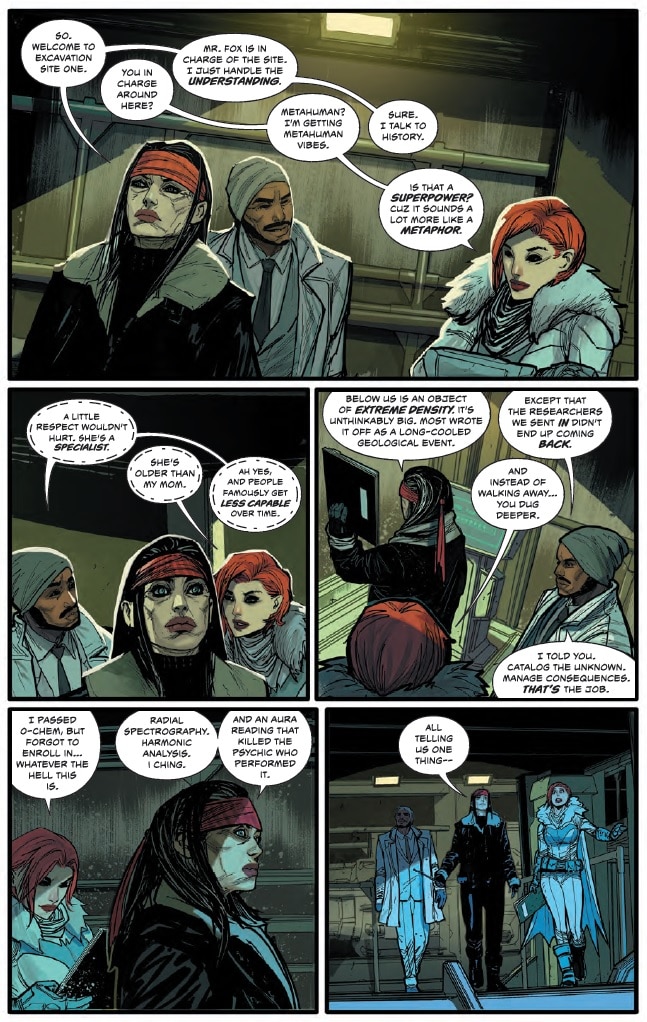
Going back to the larger DC Universe that this book is entering into, what about the current state of the DCU makes it an inspiring time to bring back elements of Planetary?
CK: We've been doing work for DC for maybe six years, seven years or so at this point. And even during that time, we have watched some fundamental shifts in the entire comic book landscape. We are children of the ’90s, so we've been loving this stuff in media res since then, while also being able to look backwards. And one of the things that I think we fell in love with as young readers was the kind of plug and play nature of comics. You can pick things up, you can kind of experience them bespoke, and you didn't really need to know the larger continuity.
But as we've seen that change, as continuity starts to really layer on top of itself and you find the joy and thrill of seeing how all these things fit together, you also start to see the cracks. You start to see where things are falling through and getting forgotten. That becomes something that you, as a meticulous fan, can start to really explore and pick at. I think for all the glorious storytelling that has been going on all over the place, but especially at DC, there has been a lot of things that have fallen through the cracks. There have been a lot of problems that have been hand waved away in ways that all have been in the service of incredible storytelling.
We are blessed to be living in an age where the comics that we are producing right now, everyone's producing, are absolutely incredible, which is awesome. But it also allows us to say, "Hey, we're going to start poking some holes here. We're going to be exploring some of these forgotten corners, not as criticism, but as exploration because we are in this kind of stable place where we can afford to start looking at the warts of our heroes."
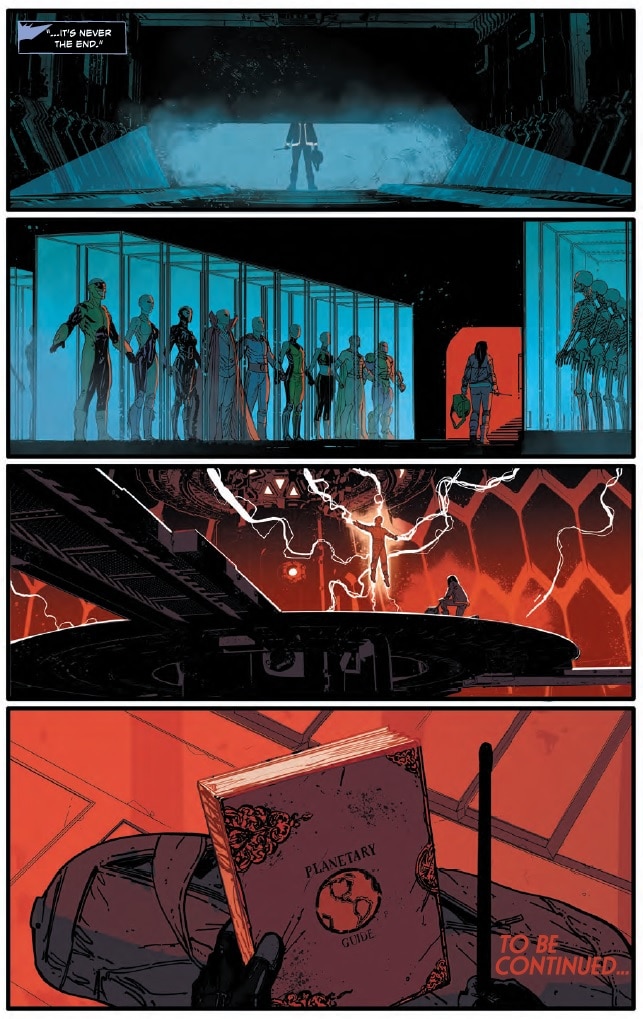
JL: To bring it back to the Planetary of it all, I genuinely think the idea of continuing Planetary is ultimate hubris. It's why we didn't talk about it in marketing. Not because we didn't want people to know what the book was. We wanted to make sure that we draw a nice demarcation line between the objectives of Planetary and the objectives of this book. The objectives of Planetary, in my opinion, is that that book takes the 20th century as a fictional framework and looks at all the fiction that took place in the 20th century and deconstructs it in an effort to talk about what that fiction did to us as a culture. But it had this really great freedom, because it was allowed to have all fiction in everything. If you wanted Dracula, you have Dracula, if you wanted Sherlock Holmes, you have Sherlock Holmes, if you wanted DC Comics, you have DC Comics. Everybody can be in this book, as long as you play by the legal framework.
Outsiders provided a really exciting opportunity to do the counterpoint to that, which is what if we did this just for the DC Universe? What if we took this fictional universe framework that has now existed for almost 100 years and has rebooted itself several times and thrown a million little problems under the rug and use that to talk not about what all of fiction has done for us, but about what DC Comics has done for us? What if we talked just about what DC Comics means and what these characters mean? Why certain characters are popular and certain characters aren't? And to do that in a way that's reflecting the 21st century, when people have become much more media literate about the DC Universe than they ever were before.
CK: Just like Kate and Luke, we are boldly diving into places we do not have the answers for, but someone must ask the questions. That is what we are here for, and hopefully Bruce doesn't get too mad at us.
Outsiders #1 by Jackson Lanzing, Collin Kelly, Robert Carey and Valentina Taddeo is now available in print and as a digital comic book.

